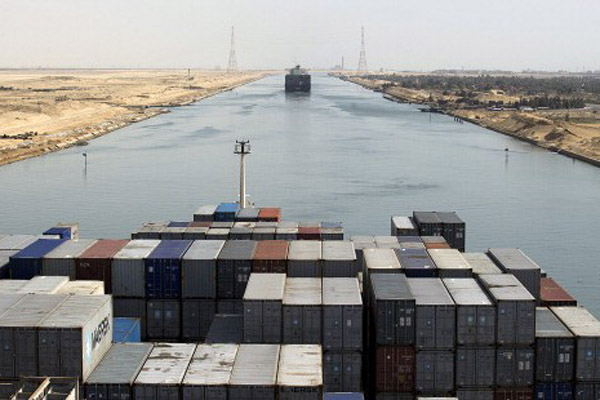by Maye Kabil
One year after announcing the idea of a new Suez Canal, people are looking forward to the opening ceremony of the project that will take place tomorrow, hoping that it would increase the benefits of the historical waterway for the Egyptian economy.
“It may prove that all Egyptian interests will profit immensely by the new channel between the Mediterranean and the Red Sea,” wrote the special correspondent of “The Telegraph” British newspaper, on November 18, 1869, after he had conducted one of the first tours by a European journalist of the recently excavated Suez Canal.
After 146 years of the event, eyes are attracted to the opening of the expansion work of the canal that is taking place tomorrow, hoping that the project will have a similar impact on the economy as the original route.
The enlargement project included also digging tunnels under the Canal, which is set to start right after the opening, with the dredging machines planned to arrive in November.
The new waterway will raise the annual revenues of Suez Canal from $5 billion currently to $ 13 billion by 2023, according to official expectation.
During the present fiscal year 2015 / 2016, the revenues are expected to increase 9 per cent thanks to the new shipping lane, as announced by the minister of planning Ashraf El-Arabi in a press conference few days ago.
Some specialists have other assessments. EFG Hermes for example says in a report that it does “not expect major impact for the new parallel waterway on revenues in FY2015 / 16, given the low oil price environment and depressed global trade activity amidst weak global growth”. The region’s leading investment bank expects more increase of the return in the medium to long-term rather than in the coming year or two.
The Canal is already one of the main sources of foreign currency for Egypt, along with tourism and remittances from Egyptian expatriates. The country’s net foreign currency reserves stood at $20.1 billion in June, according to Central Bank data.
Suez Canal tariffs are calculated in Special Drawing Rights (SDR), a weighted currency basket of the US dollar, the Euro, the British Pound and the Japanese Yen. This way of calculation makes the revenues stable and less vulnerable to currency fluctuations.
Many voices called, especially after the 25 January Revolution, for collecting the Suez Canal fees in Egyptian pounds. Campaigns through Facebook and other social networks have claimed thousands of supporters for this cause. They believe that collecting the Suez Canal fees in the local currency would lead to an increased demand for the pound because all the ships passing through the canal would have to buy the pound to pay the fees. This would in turn increase the value of the pound in international currency markets.
However, economists clarified that such a step is not possible at this stage, and would have a negative impact on the economy. Since the Canal is a main source of foreign currency, which is badly needed to finance Egypt’s imports.
The local currency gets stronger, however, by increasing the local production, and reducing the dependency on imported goods.
The second phase of the Suez Canal project involves developing the entire zone along the canal in order to create an industrial / service hub to enhance the income generated by of such key asset.
That phase is still at the planning level. The Suez Canal corridor’s special legislation has been issued, granting the zone a special status, in terms of business permits and managing its infrastructure and land allocations. The next step would entail instating the infrastructure for the entire zone with initial investment costs of USD10-15 billion. The progress on such phase awaits the completion of the legal and administrative framework according to Hermes report.
Government estimates the returns of Suez Canal corridor development by $100 billion during the next 10 years. Minister of planning said that around a million job opportunities will be created within 15 years through the intended projects in the Suez Canal’s industrial and logistics hub.
The bigger part of public investment in the new fiscal year (2015 / 2016) is directed to developing Suez Canal corridor and Sinai, with a budget of EGP51 billion (around $6.5 billion).
The minister of investment, Ashraf Salman, unveiled advanced negotiations with Saudi Arabia, Emirates, China, Italy and France to invest in the Suez Canal development, as stated in the primary plan of the corridor project.
He estimated the expected foreign investments flowing to Egypt for this zone development by $150 million in 15 years. The projects will be announced after the declaration of the final plan of the New Suez Canal, which is expected in the opening ceremony.


